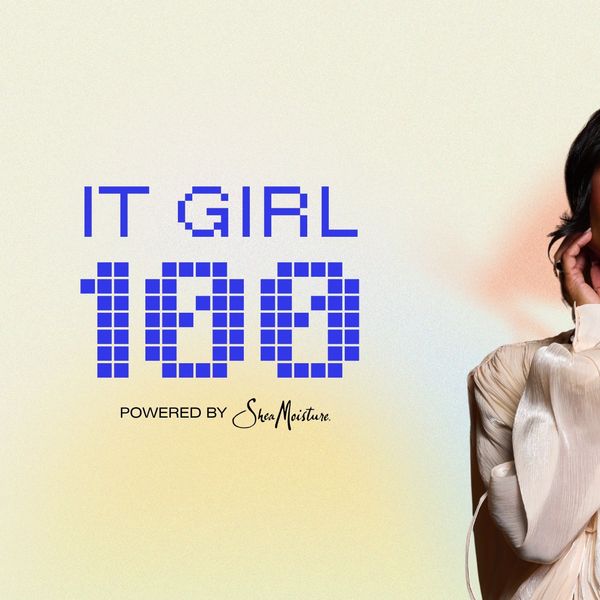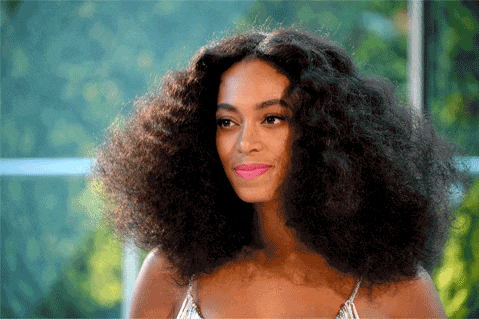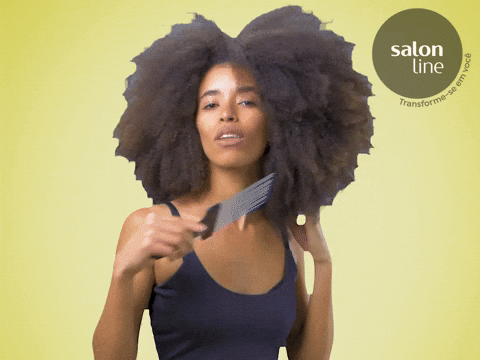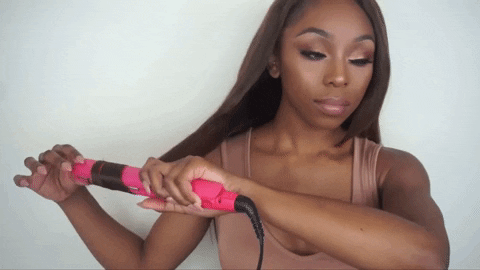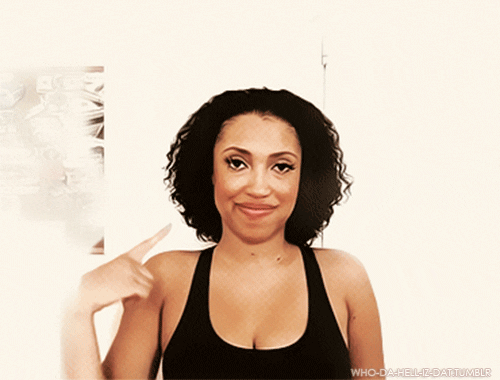10 Black Cartoon Characters Representing The Inner Child In All Of Us

Growing up, black representation was few and far between. With black leads only making up five percent of television, it was difficult to find someone who looked and act liked us, reflected on screen. Even more so, if you were looking at animations. Although, despite the lack of prominent representation, there were a few black cartoon characters that made the experience of growing up worthwhile.
From Storm's fierce relentlessness to Frozone's disarming charm, these are the top ten black cartoon characters that make our inner child scream black girl (and boy) magic.
1.Ororo "Storm" Munroe (The X-Men)
 90s marvel GIFGiphy
90s marvel GIFGiphyMaking her debut over 45 years ago, Ororo "Storm" Munroe is hands down the best cartoon depiction of what it means to be a black superhero. Despite the live action movies constantly getting her wrong—remember when Halle Berry had an accent and then suddenly didn't—the origins of this character is worth exploring. Daughter of a Kenyan tribal princess and an American journalist, Storm was orphaned at a young age. As a result, she spent time as a petty-thief before choosing to use her power for good. With the abilities to control the weather (Atmokinesis), witchcraft, telepathic resistance, and eventually godhood, Storm is one of the strongest mutants in the X-Men universe.
Not only is she a powerful superhero, but she is also a compassionate one, often using her powers to stop man-made or weather-related disasters. Nevertheless, despite being an interesting and omnipotent hero, Storm is often overlooked in films and cartoon adaptations. Although, now that Marvel has obtained the rights to X-Men, hopefully this will change in the near-future. With the care that the Marvel Universe gives towards their superhero stories, there is a good chance that will see the Storm we all deserve on the big screens soon.
2.Virgil "Static Shock" Hawkins (Static Shock)
 Giphy
GiphyGet up, get up, gotta go. Gotta get up, get up, gotta go. Here we go!
Static freaking Shock was the best thing about childhood cartoons. Premiering almost 21 years ago on WB, and 28 years ago in the comics, Static Shock is the pseudonym of teenage superhero, Virgil Hawkins. Made a social outcast due to his high intellect, Hawkins was subjected to constant ridicule and bullying from his peers. After a particularly harsh beating, Virgil attempts to get payback, where he was ambushed by the cops and sprayed with supernatural tear gas, which resulted in Hawkins obtaining electromagnetic mutant abilities. He later chooses to use his abilities to save those of Dakota City from both supernatural beings and petty criminals. Despite being an interesting superhero and having an enticing origin story and series, there hasn't been many adaptations of the cartoon/comic book character. Though, that looks like it might be changing soon.
During the DC Fandom last August, Reginald Hudlin teased an upcoming Static Shock film. Not long after, in October 2020, Blank Panther's Michael B. Jordan announced that he would be producing the Static Shock DC Superhero movie adaptation. There is still no word on who will be playing Static Shock or when the movie is set to production, but regardless of when it does, I'm sure it will do what it has always done: put "a shock to our systems" that will never run out.
3.Numbuh 5 (Codename: Kids Next Door)
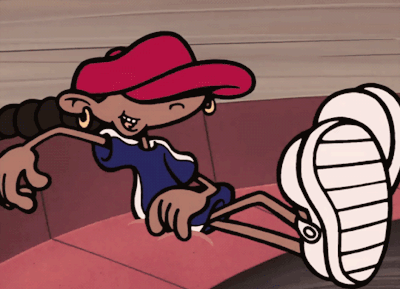
"We are the Kids Next Door, Numbuh 4! We save kids. That's our job."
A job well done, indeed. Saving us from the sheer boredom of weekends at home was the infamous and adventurous Codename: Kids Next Door. Voiced by showstopper in all things black, Cree Summer, Numbuh 5 was the best KND member around. Second-in-command, due to her relaxed nature and wicked intelligence, Numbuh 5, or Abigail Lincoln if you dare, was the only African-American teammate of the codename crew. Taking all of her missions seriously, Numbuh 5 used her book and street smarts to help execute successful operations.
Numbuh 5 was a fun character from KND. Balanced perfectly between wholehearted earnestness and plain absurdity (refusing to give up a treasure chest of candy), she often created hilarity in the foil of her character. Numbuh 5 was the first of few black female cartoon characters that was given more than background roles to play. With a good amount of the episodes surrounding Numbuh 5 and her relationship with others, it was no wonder why we were all glued to our TVs. And because they respected her enough to develop her character to be more than just her race, there is no doubt that "We're going to be Kids Next Door [fans] forever."
4.Penny Proud (The Proud Family)
 Mad The Proud Family GIFGiphy
Mad The Proud Family GIFGiphySing it with me: She's Penny Proud, she's cute and she's loud. And she gots. It. Going on.
Let's be real, you sung that in the proper cadence without me even having to mention the where to find the video. Between its original airing times, the movie, Destiny's Child and Solange Knowles' theme song, its promised revitalization on BET, and the reruns on Disney+, The Proud Family is a show that is hard to forget. It's an even harder show to put down, despite the show's final episode premiering nearly 16 years ago. The Proud Family follows the family and friends of 14-year-old Penny Proud who live in Wizville, California. Confident and fearless, Penny spends most of her time seeking out what she wants and relentlessly achieving those goals. As a jack of all trades and master of none, most of her adventures are sporadic and varying in degree.
One moment she is a pop singer, traveling the world, and the next she is attempting to babysit her siblings who insist on going on adventures of their own. With every episode being something new to explore, your journey with the Proud Family will be like traveling with your own dysfunctional family. A show ahead of its time, The Proud Family had all black families, smiling from ear to ear and glued to the TV. After all, what's better than seeing yourself reflected back on television?
Though the show follows protagonist, Penny Proud (voiced by Kyla Pratt), it is hard to watch it without acknowledging all of the characters that make us so damn proud to watch it in the first place. With Suga Mama putting her feet in everything, Oscar's constant yelling, Trudy's insistence on keeping her family together, the twins' escapades, the Gross Sisters' thieving, and Dijonay's unreliability—except in her love for Sticky, this show was only meant to succeed.
5.Frozone (The Incredibles)
 the incredibles animation GIF by Walt Disney StudiosGiphy
the incredibles animation GIF by Walt Disney StudiosGiphyFrozone probably had the total of thirty minutes of screen time in The Incredible movies combined, but in those thirty minutes, he knew how to steal a show. Known for his "where's my super suit" scene and Samuel L. Jackson voice, Frozone was a Black cartoon character that we just simply can't forget. As a longtime close friend to Mr. and Mrs. Incredible and surrogate "Uncle Lucius" to the kids, Frozone was essential to helping the Incredibles fight villains. With his ability to create ice and freeze surfaces with his hands, he often got himself and the Incredibles out of situations when super-strength just wouldn't do. Despite not seeing him nearly as much as we hope in The Incredibles and its sequel, a little birdie (Pixar Animation Studios and Walt Disney Pictures) says that they plan to release a Frozone film as the prequel to The Incredibles movies. Thus far, it looks like Samuel L. Jackson will return to voice the role, alongside Zoe Saldana, Jordan Peele, Kimberly Adair Clark, Tracy Morgan, and Craig T. Nelson.
6.Riley and Huey Freeman (The Boondocks)
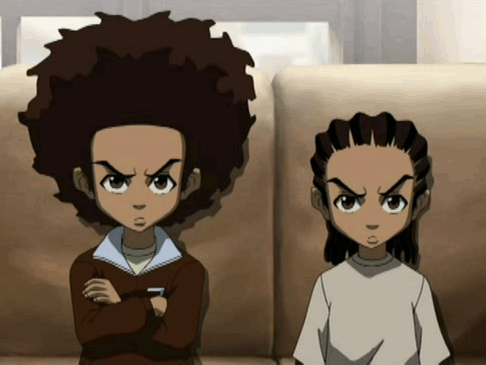
The Boondocks was a show that everyone just happened to find. Without a single amount of advertisement, rhyme, or reason, every night around midnight and two, you'd find yourself in front of the television laughing at these children, who behaved like anything but. Between Riley and his constant need to buck the system and Huey and his endless need to dismantle it, The Boondocks offered an adult animation from the perspective of children. Children, who at most times, behaved better than the adults. And man was it beautiful ride.
Balancing itself perfectly between offensive and woke, The Boondocks offered a comedic outlook on how African-Americans see themselves and the world they live in. Voiced by Regina King, John Witherspoon, Gary Anthony Williams, and other various stars and guests, The Boondocks discussed topics of Blackness in a comedic and objective way. Whether they were talking about the first Black President, systematic racism, peer pressure, perms, or the Civil Rights Movement, The Boondocks was a show that knew what story it wanted to tell and just how to tell it. Now in the political climate where it is necessary to have Black stories told, The Boondocks is seemingly set to return for the 2022 television season on HBO Max. This means more stories of the Freeman family and friends navigating the world both carefully and carelessly, and we're over the moon to see it.
7.Libby Folfax (Jimmy Neutron)
 Own It Jimmy Neutron GIF by NickelodeonGiphy
Own It Jimmy Neutron GIF by NickelodeonGiphyLiberty "Libby" Folfax is one of five central characters in Nickelodeon's Jimmy Neutron. Although, when the show first premiered it didn't seem this way. Clearly unsure of what to do with her character, in the early seasons, Libby was often seen, but rarely heard. She could be found in the background or in Cindy's shadow offering very little lines with even less substance. Nevertheless, this was rectified in season three of the beloved television show, and with this came the endless joy of Libby Folfax. From discovering her ancestor was an Egyptian queen to fashion model turned werewolf, and eventual dictator, Libby was given one interesting story after the other for little Black girls to fall in love with. With her candid personality, inability to lie, and levelheadedness, Libby was often a breath of fresh air in a show that thrived on endless chaos.
8.Susie Carmichael (The Rugrats)
 nicksplat rugrats GIFGiphy
nicksplat rugrats GIFGiphySusie Carmichael was the absolute best. She was kind, caring, witty, and most importantly, she read Angelica for filth. Though she didn't appear in Rugrats nearly as much as she should've, when she did, Susie stole the show. First appearing in the 1993 episode, "Meet the Carmichaels," Susie quickly showed herself to be a promising character. Bright, friendly, fun-loving Susie was often put against Angelica, showing that she was willing to be supportive of Tommy and the crew's adventures. Ever the protector, she often stood up for the babies when bullies would attempt to get in their way and showed herself to be a character worthy of admiration. Eventually Susie and her family were given their own-spin off, The Carmichaels, nevertheless due to the Rugrats and All Grown Up universes, the series was axed due to continuity issues, leaving Susie and all her glory behind.
9.Princess Tiana
 New Orleans Food GIF by DisneyGiphy
New Orleans Food GIF by DisneyGiphyTo be honest, I am indifferent towards Princess Tiana. Admittedly, this indifference has nothing to do with Princess Tiana herself, but everything to do with The Princess and the Frog. I found it frustrating that when given the first chance to have a Black princess, Disney doesn't actually make her a princess, but a damn frog for the majority of the film. As if it couldn't get worse, the film's use of voodoo, jazz, and African-American dialect reflected the Black community in some unflattering light. Regardless, this is not meant to bash the Disney film that came out nearly 12 years ago, instead it's to mention and appreciate the only thing they managed to get right: Princess Tiana.
Voiced and sung by the amazing and disgustingly under-appreciated Anika Noni Rose, Princess Tiana is the first Disney princess who creates her own wealth, dreams, and manages to not be saved by a prince, or any man, for that fact. With her lively number of "Almost There," Princess Tiana encourages young Black girls to be driven and hardworking, as she works towards her goal of fixing up an old sugar mill to pursue her dream of creating her own restaurant. She constantly faces challenges, from being a social outcast to being a Black woman in the 1920s, yet she remains unshakably true to herself and her dreams, while dealing with the pressure of others. Despite the movie's issues, Tiana makes for a worthy heroine to root for and reflects the magic—and sometimes burden— of being a Black woman accurately and well.
10.Garnet (Steven Universe)
 steven universe garnet GIFGiphy
steven universe garnet GIFGiphy"Take a moment to remind yourself to take a moment and find yourself."
If you're looking for a strong, fierce, and clever character development, look no further than Steven Universe's Garnet. A fusion of the Ruby and Sapphire, Garnet is one of the most dynamic characters on this innovative and daring show. As the leader of the Crystal Gems, she is known to be a pragmatic, blunt character, though she rarely thinks a situation through before acting. With her combined size and strength, Garnet makes for a formidable hero against the show's biggest and baddest villains.
And with her old (yet youthful appearance) age, comes limitless wisdom, which she isn't afraid to share with her Gem family and audience alike. Garnet teaches young Black girls to be outwardly and unapologetically themselves, despite the expectations forced on them by society. Not to mention, she is voiced by singer Estelle, which makes her songs soulful and enticing to listen to.
Featured image via Giphy
- A Different World Cast, Where Are They Now? - xoNecole: Women's ... ›
- 14 Black AF TV Show Characters That Are Our Forever Natural Hair ... ›
- The Best Black Cartoon Characters of All Time ›
- Black Girl Cartoon Characters We Can All Relate To — Blk Girl Culture ›
- 19 Cartoon Characters Every Black Kid Grew Up Admiring ›
- Top 10 Black Female Cartoon Characters – Black Girl Nerds ›
- 39 Best Black Cartoon Characters From All Generations - That Sister ›
This Is How To Keep 'Holiday Season Stress' From Infecting Your Relationship
Hmph. Maybe it’s just me, but it seems like there is something really weird happening in the fall season air (because winter doesn’t officially begin until December 21) that cuddle season is in full swing while break-up season is as well. In fact, did you know that break-ups are so popular during the holiday season that December 11 is deemed Break-Up Day?
The reasons why relationships shift around this time vary; however, I did both roll my eyes and chuckle when I read that a very popular one is because it’s an easy way to get out of getting one’s significant other a Christmas present. SMDH.
Anyway, I personally think that the less shallow folks out here may contemplate calling things “quits” or they at least distance themselves a bit from their partner (and what I’m referring to is serious relationships) due to all of the stress and strain that oftentimes comes with the holidays whether it be financial, familial, due to their tight schedules or something else.
Listen, I would hate for you and your man to miss the fun and happiness of experiencing this time of year, all because you are so overwhelmed or irritated that you can’t really enjoy it. That’s why I have a few practical tips for how to avoid allowing the typical holiday season stress from INFECTING your relationship.
Manage Your Expectations
 Giphy
GiphyUnmanaged expectations. If there is a main reason why the holiday season tends to be so stress-filled for so many people, I’d bet good money that this is the cause. And when you’re in a long-term relationship, expectations can manifest themselves in all sorts of cryptic and/or unexpected ways. You might have relatives who assume that you are going to be with them for Thanksgiving or Christmas when you have other plans in mind. You might be thinking that you are going to spend one amount for presents while your man is thinking something totally different. When it comes to scheduling, your signals may be crossed.
And you know what? To all of these scenarios, this is where clear and consistent communication come in. Don’t assume anything. Don’t dictate anything either. From now until New Year’s, mutually decide to check in once a week, just to make sure that you are both on the same page as it relates to the holidays and what you both are thinking will come along with it. The less blindsided you both feel, the less stressed out you will be. Trust me on this.
Set (and Keep) a Budget
 Giphy
GiphyOkay, so I read that last year, 36 percent of Americans incurred some type of holiday-related debt. Hmph. Last year, there was still some sense of normalcy in this country, chile, so I can only imagine what finances are gonna look like over the next several weeks. That said, since I don’t know a lot of people who don’t find being broke stressful, make sure that you and your bae set a budget and then stick to it this year — no ifs, ands or buts.
Because really, y’all — it doesn’t make sense to deplete savings and/or max out credit cards for a few days of giggles only to be damn near losing your mind because you don’t know how to make ends meet come Dr. Martin Luther King, Jr. Day.
And by the way, this tip doesn’t just speak to things like food and gifts; I also mean travel. If it doesn’t make a ton of sense (or cents) to be all over the place this year — DON’T BE.
Keep Matthew 5:37 at the Forefront
 Giphy
GiphyIf off the top of your head, you don’t know what Matthew 5:37 says, no worries, here ya go: “But let your ‘Yes’ be ‘Yes,’ and your ‘No,’ ‘No.’ For whatever is more than these is from the evil one.” That verse right there? Oh, it’s a boundaries lifesaver! I say that because do you see “maybe” or “I’ll think about it” in there? Nope. LOL. It says that you should tell people “yes” or “no” and leave it at that — and that complements Anne Lamott’s quote, “’No’ is a complete sentence” impeccably well. Yeah, you’ve got to remember that anything beyond a yes or no to a request is privileged information; you don’t owe anyone details or an explanation.
Besides, if you are really honest with yourself, when someone asks you something and you give a “Umm, let me think about it” kind of reply, more times than not, you already know what your answer is going to be — so why not let you both off of the hook? Give your response. Commit to that. And let everyone (including yourself) get on with their lives and schedules.
I promise you that when it comes to those holiday parties, you are pissing more folks off by not RSVP’ing or doing so and not showing up than just saying, “Thank you but not this year” off the rip.
Remember That Your Personal Space Is Privilege Not a Right
 Giphy
GiphyA friend of mine recently bought a new house and invited me over to come see it. He’s a single man with no children, so as I was taking in all of the space that he had, especially as I walked through his finished basement, I joked about relatives coming to live with him. “Hell no” and “absolutely not” were pretty much his immediate responses as he went on to say that some folks even had the nerve to be offended when he told them that he had no intentions on taking DNA in.
Ain’t it wild how people think that your stuff is their right? And yes, that brings me to my next point. Your home is your sanctuary space. If you want to host folks this year — cool. If not, ALSO COOL. Please don’t let folks (family included) guilt you into how they want you to act or even into what they would do if the shoe was on the other foot. You are not them — and as one of my favorite quotes states, “If two people were exactly alike, one of them would be unnecessary.” (A man by the name Larry Dixon said that.)
Hell, my friends? They know that I am good for sending them random things that they need or even want all throughout the year. Coming over to hang out at my pace, though. Uh-uh. Chalk it up to being a card-carrying member of the ambivert club yet I like keeping my living space personal — and I sleep like a baby, each and every night, for feeling that way.
Always remember that your space, your time, your resources, your energy and shoot, yourself period (including your relationship), are all things that are your own. You get to choose how, when and why you want to share them. The holiday season is certainly no exception.
Cultivate Some “You Two Only” Traditions
 Giphy
GiphyIt’s not uncommon for some couples to hit me up after the holiday season to “detox.” Sometimes it’s due to the financial drama (and sometimes trauma) that they experienced. Sometimes it’s because they allowed their relatives (especially in-laws) to get more into their personal business than they should’ve. More than anything, though, it tends to be because they didn’t get enough quality time together and so ended up feeling “disconnected.”
Please don’t let that happen. Listen, I’m not even a holidays kind of woman and yet, I will absolutely sit myself down with some hot chocolate and chocolate chip cookies to enjoy a Hallmark holiday film or two. Aside from the fact that most of them are lighthearted and sweet, I also like that they usually focus on couples loving on each other amidst all of the holiday beauty and ambiance — which is something that all couples should set aside some time to do.
Maybe it’s a vacation. Maybe it’s a staycation. Or maybe it’s my personal favorite, A SEXCATION. Whether it’s for a few days, the weekend or even overnight — don’t you let the holidays go by without setting aside time for you and your man to celebrate one another. Don’t you dare (check out “Are You Ready To Have Some Very Merry 'Christmas Sex'?”).
GET. SOME. REST.
 Giphy
GiphyI once read that 8 out of 10 people get stressed out over the holidays and 3 out of 10 lose sleep during to it — and when you’re stress-filled and sleep-deprived, that can absolutely lead to hypersensitivity, making mountains out of molehills and even not being in the mood for sex.
Your relationship can’t afford to go through any of this, so definitely make sure to prioritize rest. I don’t care how unrealistic it might seem during this time, sleep should never be seen as a luxury; it will always and forever be a great necessity.
That said, try to get no less than six hours of shut-eye in (check out “6 Fascinating Ways Sex And Sleep Definitely Go Hand In Hand”) and even ask your bae to take a nap with you sometimes (check out “Wanna Have Some Next-Level Sex? Take A Nap, Sis.”). Not only will sleep help to restore your mind, body and spirit but, when it’s with your partner, it’s an act of intimacy that can make you both feel super connected, even in the midst of what might feel like chaos.
___
Holiday season stress is real. Still, never give it the permission or power to throw your relationship off. Put you and your man first and let the holidays be what they are gonna be, chile.
Let’s make things inbox official! Sign up for the xoNecole newsletter for love, wellness, career, and exclusive content delivered straight to your inbox.
Featured image by Shutterstock
It’s probably been over the past 2-3 years that I’ve become hyper-focused when it comes to applying certain chemical exfoliants known as acids to my skin. Personally, I’ve come to really appreciate ones like mandelic acid and hyaluronic acid because they have a way of softening my skin, brightening it up and really evening out my complexion overall.
In fact, on my skin, they have been so effective that they have caused me to wonder what would happen if I applied some of them to my hair too — and boy, was it an experiment that paid off big time!
If, while on your continual journey to get the best out of your own tresses, you’d like to learn how to get them healthier than it’s ever been, I’ve got seven acids that are typically known for skin use that can be just as beneficial to your hair as well.
1. Salicylic Acid
When it comes to your skin, salicylic acid is beta-hydroxy acid that is great for your skin if you’re looking for something that will exfoliate it, clear out your pores and dissolve dead skin cells. In fact, this is why it’s an acid that is quite popular when it comes to treating acne.
Your hair will enjoy salicylic acid because, if you’re looking to remove product build-up, you want to soothe an itchy or irritated scalp or you’ve got some dandruff flakes that are totally driving you up the wall, salicylic acid has the ability to treat all of this. Either purchasing a shampoo that contains this ingredient or adding it to your favorite scalp scrub is probably the most effective way to get the most out of it.
Just make sure that if your scalp is sensitive or dry that you approach with caution. In these instances, it could end up irritating your scalp more than helping it out, so use a very little bit in the beginning to make sure that it vibes with you.
2. Lactic Acid
Lactic acid is an alpha hydroxy acid that can help to even out your skin tone as well as slow down the signs of aging. The properties in it help to do this by reducing hyperpigmentation and boosting collagen production in your skin as well as keeping it hydrated.
Why is it great for your locks? For one thing, lactic acid is considered to be a humectant. This means that it pulls water from the air so that your hair is able to remain moisturized.
Another thing that makes it a winner is the fact that lactic acid breaks down dead skin cells on your scalp (so that your hair follicles are able to flourish), it can help to soften and detangle your hair (making it a helpful addition on your wash days) and it also helps to protect your tresses from heat styling tools and UV damage. Applying a hair rinse that’s made up of part lactic acid and part water can work wonderfully (so long as you apply it once a month, tops; more than that might be too “intense” for your hair strands).
3. Glycolic Acid
Glycolic acid is a water-soluble alpha hydroxy acid that is actually made from sugar. Your skin will adore it because it smooths the appearance of fine lines and wrinkles, improves the texture of your skin, gently exfoliates, clears your pores and brightens up your complexion overall.
The reasons why you should consider this acid for your hair is because it helps to keep your scalp youthful (and yes, there is such a thing; check out “Your Scalp Ages Six Times Faster Than Your Face. Why It Matters.”), removes excess sebum (that could be clogging up your hair follicles) and it helps to keep your hair moisturized. Your best bet here is to make it a part of your pre-shampooing ritual.
4. Succinic Acid
Succinic acid is an acid that is made from sugar cane and contains antimicrobial and anti-inflammatory properties. Although it doesn’t exactly exfoliate (like many of these other acids do), it can still be beneficial to your skin when it comes to reducing the kind of irritation that is associated with eczema, decreasing the bacteria that leads to breakouts and keeping your skin pretty hydrated.
As far as your hair goes, this is an acid that is worth trying out because it helps to balance the sebum that is on your scalp, remove dead skin and product build-up that can irritate your scalp and clog your hair follicles and, succinic acid is also beneficial when it comes to reducing dandruff and helping to prevent hair loss. Most people tend to apply this as a serum.
5. Hyaluronic Acid
I’ve officially sung the praises of hyaluronic acid on this platform before. One example is via the article, “Why Your Skin, Hair, And Nails Need Hyaluronic Acid Like...Yesterday.” On the skin tip, hyaluronic acid is great because it deeply hydrates your skin, contains anti-aging properties and can even bring relief to vaginal (including vulvar) dryness.
Your hair will adore this particular acid because it aids moisture to it (including your hair follicles), will help to improve your hair’s texture and it also soothes scalp dryness, nurtures the cuticles of your tresses and decreases frizz. Using a serum rich in this acid as a pre-poo or as a leave-in conditioner is recommended.
6. Azelaic Acid
If you’ve never heard of azelaic acid before, this is your lucky day. It’s a dicarboxylic acid that, when it comes to skincare (and hair care) products, is usually synthetic. Anyway, if you are looking for a way to reduce inflammation, even skin tone after a breakout or if you want to use an exfoliant that will improve the texture of your skin overtime, you might want to give this acid a shot.
This one makes the list as far as your hair is concerned because, if achieving more inches is your current focus, azelaic acid might come in handy. That’s because it is able to strengthen your hair, thicken your strands and also stimulate hair growth from within your hair follicles.
7. Glutamic Acid
Glutamic acid is actually a type of amino acid. Skin-wise, it’s great for deeply hydrating your skin as well as protecting it from pollutants and damaging UV rays. Also, if you’re looking for an acid that treats skin dryness or “tightness,” this could be the answer to your prayers.
Since glutamic acid is also considered to be a humectant, it’s another acid that can moisturize your hair. As a result, it can decrease breakage while helping your hair to feel smooth and look shiny.
BONUS: Amino Acids
Speaking of amino acids and hair, please try to keep some amino acids in your diet at all times. The reason why is because, since your hair is made up of mostly protein (keratin, to be exact), amino acids are pretty darn effective when it comes to helping you to maintain the overall health and well-being of your hair.
Ones to prioritize include proline (it boosts collagen so that your hair strands can maintain flexibility); arginine (it increases blood flow to your hair follicles so that they can receive the nutrients that they need); cysteine (it helps to keep your hair follicles healthy); alanine (it helps your system to produce more collagen), and isoleucine (it strengthens the tissues that help to make up your hair strands). All of these are available in supplement form or you can use Google to see which foods contain them.
___
Although it might initially seem odd to apply acid to your hair, as you can see, certain ones will work miracles for it. So, test them out to see which one tickles your fancy.
Hell, since they work for your skin as well — it’s a two-for-one deal that is worth every penny!
Let’s make things inbox official! Sign up for the xoNecole newsletter for love, wellness, career, and exclusive content delivered straight to your inbox.
Featured image by Shutterstock






